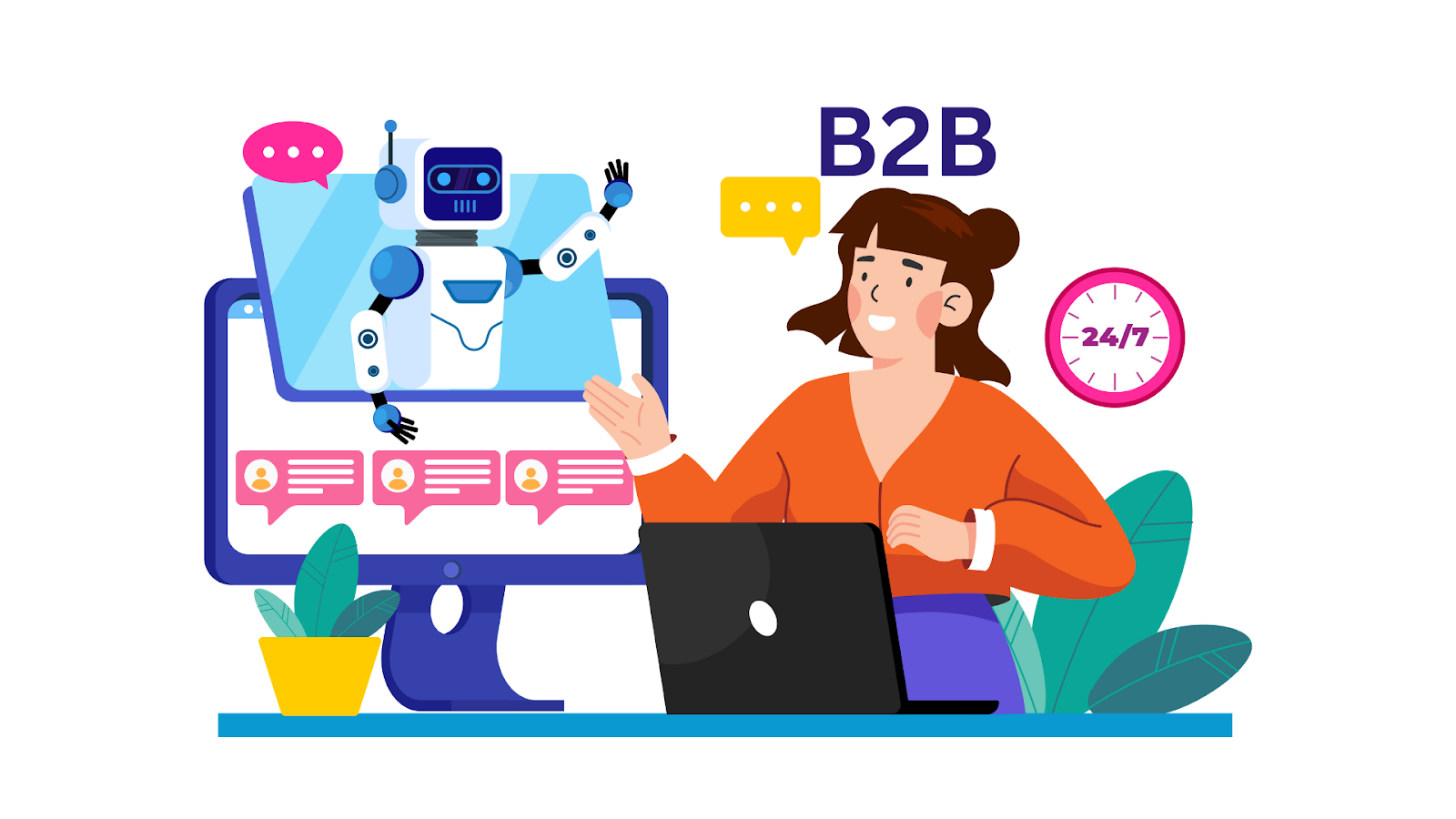Transforming B2B Marketing and Sales with AI
Discover how integrating AI into B2B marketing and sales can automate processes, personalize customer interactions, and boost overall efficiency.

B2B sales can feel like trying to solve a Rubik's Cube while riding a roller coaster. You’ve got endless leads to sort through, personalized messages to create, and customer data to analyze—all while chasing ambitious revenue goals. It’s exhausting. That’s where AI in B2B marketing and sales steps in as your ultimate sidekick.
By automating the boring stuff, spotting the leads worth your time, and helping you connect with customers personally, AI makes your workday much easier—and way more productive.
The real power lies in its ability to not only streamline processes but also drive real-time decisions. Now, let’s dive into the specific ways AI is changing the landscape of marketing and sales, step by step.
How Is AI Revolutionizing B2B Marketing and Sales
AI in B2B marketing and sales operates as a transformative tool, optimizing processes and delivering actionable insights that enable businesses to enhance personalization, automate workflows, and drive revenue growth. Here's how it works:
1. Data Collection and Processing
AI begins by processing vast amounts of data—whether it’s customer interactions, sales history, or industry trends. This data is gathered from various touchpoints, such as CRM systems, emails, social media, and website interactions.
In marketing, AI analyzes customer behavior across multiple channels, enabling businesses to understand what resonates with their audience and predict future actions.
2. Content Creation and Personalization
In sales, AI can automate the creation of proposals, contracts, and email outreach, ensuring that sales reps spend less time on manual tasks and more time engaging with high-potential leads.
3. Lead Scoring and Prioritization
By evaluating patterns in how previous customers engaged and ultimately made purchases, AI can assign a lead score based on a set of defined criteria. This helps sales teams focus their efforts on the leads that are most likely to generate revenue. With AI-powered lead scoring, sales teams can prioritize outreach to high-potential customers, resulting in more effective and efficient sales efforts.
4. Sales Forecasting
By analyzing data from various sources, AI can provide insights into future demand, market trends, and potential sales opportunities. These insights help businesses plan and allocate resources more effectively. Sales teams can use AI-generated forecasts to allocate budgets, predict quarterly sales, and adjust strategies to meet changing market conditions.
5. Chatbots and Virtual Assistants
These bots can answer questions, assist with lead qualification, and even schedule meetings. They can handle a wide range of tasks that would typically require human agents, allowing businesses to scale their customer support and sales efforts without increasing headcount. AI-driven chatbots assist in customer service by answering FAQs, managing queries, and engaging prospects in real-time, improving both lead qualification and customer satisfaction.
6. Automated Follow-Ups and Engagement
In B2B sales, following up with prospects is crucial for nurturing relationships and closing deals. AI can automate follow-up emails, scheduling, and reminders, ensuring that no lead is forgotten. It can also tailor each follow-up message based on the customer’s past behavior, ensuring that the communication feels personal and relevant. AI-driven follow-ups can be sent automatically at optimal times, ensuring timely and relevant engagement with prospects, boosting conversion rates, and shortening the sales cycle.
7. Optimizing Customer Interactions
AI continuously learns from customer interactions and feedback. By analyzing conversations, feedback, and purchase behaviors, AI can suggest optimal engagement strategies and provide real-time recommendations to sales teams. This empowers sales representatives to have more meaningful conversations with prospects, enhancing their chances of closing deals. AI tools can suggest talking points, content recommendations, and responses during sales calls or meetings, based on real-time insights from customer data.
Ready to revolutionize your sales process? Alisha, powered by Floworks AI, automates lead generation, personalizes outreach, and schedules meetings—all autonomously. Experience a 12x increase in sales efficiency and scale your revenue effortlessly.
Let’s take a closer look at how AI is making a difference in B2B marketing and sales.
The Benefits of AI in B2B Marketing
AI is transforming B2B marketing by enabling smarter, data-driven strategies. From creating personalized content to improving customer engagement and optimizing ad performance, AI helps businesses make more informed decisions, streamline processes, and drive stronger connections with their audience.
- Enhanced Content Creation: AI streamlines content generation by producing personalized emails, social media posts, and other marketing materials tailored to individual customer preferences.
- Improved Customer Engagement: By analyzing customer behavior, AI enables the development of targeted campaigns that resonate with specific audience segments, fostering stronger relationships and increased brand loyalty.
- Optimized Ad Performance: AI tools assist in refining advertising strategies by predicting customer responses and adjusting campaigns in real-time, leading to more effective ad spend utilization.
- Data-Driven Decision Making: AI processes vast amounts of data to uncover insights, allowing marketers to make informed decisions and adapt strategies based on predictive analytics.
While AI plays a pivotal role in enhancing marketing efforts, its impact extends just as profoundly to the sales process. Let’s now explore how AI is transforming B2B sales and empowering teams to drive more revenue with greater efficiency.
The Benefits of AI in B2B Sales
From speeding up proposal development to enhancing lead scoring and forecasting, AI helps sales teams work more efficiently, prioritize high-potential prospects, and engage customers more effectively.
- Accelerated Proposal Development: AI expedites the creation of customized proposals by analyzing client needs and generating relevant content, reducing the time sales teams spend on proposal preparation.
- Enhanced Lead Scoring: By evaluating historical data and customer interactions, AI accurately scores leads, enabling sales representatives to prioritize high-potential prospects effectively.
- Predictive Sales Forecasting: AI models forecast future sales trends by analyzing current and historical data, aiding in resource allocation and strategic planning.
- Improved Customer Interaction: AI-driven tools provide real-time recommendations during customer engagements, enhancing the quality of interactions and increasing the likelihood of closing deals.
Also Read: A Guide to Writing Cold Email Outreach: Best Practices
It’s important to be mindful of the challenges that come with its integration. From data privacy concerns to the need for human oversight, these factors require careful consideration. So, how can businesses overcome these obstacles and truly harness the power of AI? Let’s explore the best practices for successful AI adoption.
Challenges and Considerations in Using AI in B2B Marketing and Sales
AI solutions present both opportunities and challenges in B2B marketing and sales. Here are the key challenges and considerations:
Data Privacy Concerns
AI relies heavily on customer data, raising concerns about data privacy and compliance with regulations such as GDPR and CCPA. Organizations must ensure that they handle customer information responsibly and securely to avoid breaches and legal repercussions.
Quality Control
While AI tools can produce content quickly, the quality of this content may vary. Ensuring that AI-generated materials align with brand voice and messaging requires human oversight, which can be resource-intensive.
Integration with Existing Systems
Implementing AI tools within existing marketing and sales infrastructures can be challenging. Organizations need to ensure seamless integration with current technologies and workflows to leverage AI capabilities fully.
The Need for Human Oversight
AI can’t replace the human touch in sales and marketing. Businesses must ensure a balance between automation and genuine customer engagement.
Organizational Change Management
Integrating AI requires a shift in mindset, tools, and workflows. Training teams to adopt AI effectively is critical to success.
Building an AI-powered strategy isn’t just about choosing the right tools—it’s about laying the foundation for seamless integration and effective usage. Let’s take a step-by-step approach to adopting AI in your business, ensuring that every decision aligns with your long-term goals.
Creating a Roadmap for Adopting AI in Your B2B Marketing & Sales
Integrating AI into your B2B strategy can significantly enhance marketing and sales efforts. Here's a structured approach to adopting this transformative technology:
1. Assess Current Capabilities and Identify Opportunities
- Evaluate Existing Processes: Examine current marketing and sales workflows to pinpoint areas where AI can drive improvements.
- Set Clear Objectives: Define specific goals for AI implementation, such as enhancing personalization or optimizing content creation.
2. Unify and Prepare Your Data for AI
- Data Integration: Consolidate data from various sources to create a comprehensive dataset suitable for AI analysis.
- Data Quality: Ensure data accuracy and completeness to facilitate effective AI learning and decision-making.
3. Select Appropriate AI Tools and Platforms
- Align with Business Needs: Choose AI solutions that address identified challenges and integrate seamlessly with existing systems.
- Scalability: Opt for tools capable of adapting to evolving business requirements.
4. Develop a Phased Implementation Plan
- Pilot Projects: Initiate small-scale AI projects to test functionality and gather insights.
- Iterative Scaling: Expand AI applications gradually based on pilot outcomes, ensuring continuous alignment with business objectives.
5. Invest in Training and Change Management
- Skill Development: Equip teams with the necessary skills to operate and manage AI tools effectively.
- Foster Adaptability: Promote a culture receptive to AI-driven changes through clear communication and support.
6. Establish Monitoring and Evaluation Mechanisms
- Performance Metrics: Define key performance indicators to measure AI's impact on marketing and sales activities.
- Continuous Improvement: Regularly review AI performance and make data-driven adjustments to optimize outcomes.
Also Read: AI SDR Sales: Building Trust in the Age of AI
Conclusion
AI is revolutionizing B2B marketing and sales by addressing inefficiencies, enhancing personalization, and enabling scalability. While challenges like data privacy and ethical considerations exist, businesses that adopt AI can optimize operations, build stronger customer relationships, and achieve measurable growth in a competitive landscape.
At Floworks, we deliver AI-driven solutions to tackle these challenges, helping businesses streamline workflows, automate lead generation, and enhance customer engagement. We can align our AI capabilities with your goals and turn obstacles into opportunities for success.
Take the leap into more innovative marketing and sales with Floworks—let Alisha AI transform your business today! Book a Demo now


